- Home
- Evelyn Waugh
Officers and Gentlemen Page 7
Officers and Gentlemen Read online
Page 7
Here Tommy intervened. ‘I hope you’ve no complaint about it being misused, sir?’
‘Or dynamite?’ continued the laird disregarding. ‘Any explosive would do.’
At this moment the piper put an end to the conversation. He was followed by the butler bearing a huge joint which he set before the host. Round and round went the skirl. Colonel Campbell hacked away at the haunch of venison. The butler followed his own devious course with a tray of red-currant jelly and unpeeled potatoes. Not before the din was over and a full plate before him did Guy realize that a young lady had unobtrusively slipped into the chair beside him. He bowed as best he could from the intricate framework of antlers which constituted his chair. She returned his smile of greeting liberally.
She was, he judged, ten or twelve years younger than himself. Either she was freckled, which seemed unlikely at this place and season, or else she had been splashed with peaty water and had neglected to wash, which seemed still less likely in view of the obvious care she had taken with the rest of her toilet. An hereditary stain perhaps, Guy thought, suddenly appearing in Mugg to bear evidence of an ancestral seafaring adventure long ago among the Spice Islands. Over the brown blotches she was richly rouged, her short black curls were bound with a tartan ribbon, held together by a brooch of the kind Guy had supposed were made only for tourists, and she wore a dress which in that hall must have exposed her to an extremity of frigeration. Her features were regular as marble and her eyes wide and splendid and mad.
‘You aren’t doing very well, are you?’ she remarked suddenly on a note of triumph.
‘This is Mr Crouchback, dear,’ said Mrs Campbell, frowning fiercely at her husband’s great-niece.’ Miss Carmichael. She comes from Edinburgh.’
‘And a true Scot,’ said Miss Carmichael.
‘Yes, of course, Kate. We all know that.’
‘Her grandmother was a Campbell,’ said the laird, in a tone of deepest melancholy, ‘my own mother’s sister.’
‘My mother was a Meiklejohn and her mother a Dundas.’
‘No one is questioning your being a true Scot, Katie,’ said the great-aunt; ‘eat your dinner.’
During this exchange of genealogical information, Guy had pondered on Miss Carmichael’s strange preliminary challenge. He had not distinguished himself, he fully realized, in the preceding conversation, though it would have taken a master, he thought, to go right. And, anyway, how did this beastly girl know? Had she been hiding her freckles in the smoke, or, more likely, was she that phenomenon, quite common, he believed, in these parts – the seventh child of a seventh child? He had had a hard day. He was numb and choked and under-nourished. An endless procession marched across his mind, Carmichaels, Campbells, Meiklejohns, Dundases, in columns of seven, some kilted and bonneted, others in the sober, durable garb of the Edinburgh professions, all dead.
He steadied himself with wine, which in contrast to soup or fish was excellent. ‘Doing well’, of course, was an expression of the nursery. It meant eating heavily. Hitherto instinct and experience alike had held him back from the venison. Now, openly rebuked, he put a fibrous, rank lump of the stuff into his mouth and began desperately chewing. Miss Carmichael turned back to him.
‘Six ships last week,’ she said. ‘We can’t get Berlin, so we have to go by your wireless. I expect it’s a lot more really, ten, twenty, thirty, forty…’
The laird cut across this speculation by saying to Tommy, ‘That’s what sappers are for, aren’t they? – blowing things up.’
‘They built the Anglican Cathedral in Gibraltar,’ said Guy, in a stern effort to ‘do better’ but rather indistinctly, for the venison seemed totally unassimilable.
‘No,’ said the laird. ‘I went to a wedding there. They didn’t blow that up. Not at the time of the wedding anyhow. But rocks, now.’ (He looked craftily at Tommy.) ‘They could blow rocks up, I dare say, just as easily as you and I would blow up a wasps’ nest.’
‘I should keep a long way off if they tried,’ said Tommy.
‘I always told my men that the nearer you are to the point of an explosion, the safer you are.’
‘That’s not the orthodox teaching nowadays, I’m afraid.’
Miss Carmichael had stopped counting and said: ‘We have quite grown out of the Bonnie Prince Charlie phase, you know. Edinburgh is the heart of Scotland now.’
‘A magnificent city,’ said Guy.
‘It’s seething.’
‘Really?’
‘Absolutely seething. It is time I went back there. But I’m not allowed to talk about it, of course.’
She produced from her bag a gold pencil and wrote on the tablecloth, guarding her message with her forearm.
‘Look.’
Guy read: ‘POLLITICAL PRISNER’ and asked with genuine curiosity:
‘Did you pass your exams at Edinburgh, Miss Carmichael?’
‘Never. I was far too busy with more important things.’
She began vigorously rubbing the cloth with breadcrumbs and suddenly, disconcertingly, assumed party manners saying:
‘I miss the music so. All the greatest masters come to Edinburgh, you know.’
While she wrote, Guy had managed to remove the venison from his mouth to his plate. He took a draft of claret and said clearly:
‘I wonder if you came across a friend of mine at the University. Peter Ellis – he teaches Egyptology or something like that. He used to seethe awfully when I knew him.’
‘He did not seethe with us.’
The laird had finished his plateful and was ready to resume the subject of explosives.
‘They need practice,’ he roared, interrupting his wife and Tommy who were discussing submarines.
‘We all do, I expect,’ said Tommy.
‘I will show them just the place. I own the hotel, of course,’ he added without apparent relevance.
‘You think it spoils the view? I’m inclined to agree with you.’
‘Only one thing wrong with the hotel. Do you know what?’
‘The heating?’
‘It doesn’t pay. And d’you know why not? No bathing beach. Send those sappers of yours up to me and I can show them the very place for their explosion. Shift a few tons of rock and what do you find? Sand. There was sand there in my father’s time. It’s marked as sand on the Survey and the Admiralty chart. Bit of the cliff came down; all it needs is just lifting up again.’
The laird scooped the air as though building an imaginary sand-castle.
With the pudding came the nine-o’clock news. A wireless-set was carried to the centre of the table, and the butler tried to adjust it.
‘Lies,’ said Miss Carmichael. ‘All lies.’
There was a brief knock-about turn such as Scots often provide for their English guests, between the laird and his butler, each displaying feudal loyalty, independence, pure uncontrolled crossness and ignorance of the workings of modern science.
Sounds emerged but nothing which Guy could identify as human speech.
‘Lies,’ repeated Miss Carmichael. ‘All lies.’
Presently the machine was removed and replaced with apples.
‘Something about Khartoum, wasn’t it?’ said Tommy.
‘It will be retaken,’ announced Miss Carmichael.
‘But it was never lost,’ said Guy.
‘It was lost to Kitchener and the Gatling-gun,’ said Miss Carmichael.
‘Mugg served under Kitchener,’ said Mrs Campbell.
‘There was something I never liked about the fellow. Something fishy, if you know what I mean.’
‘It is a terrible thing,’ said Miss Carmichael, ‘to see the best of our lads marched off, generation after generation, to fight the battles of the English for them. But the end is upon them. When the Germans land in Scotland, the glens will be full of marching men come to greet them, and the professors themselves at the universities will seize the towns. Mark my words, don’t be caught on Scottish soil on that day.’
‘Kati
e, go to bed,’ said Colonel Campbell.
‘Have I gone too far again?’
‘You have.’
‘May I take some apples with me?’
‘Two.’
She took them and rose from her chair.
‘Good night, all,’ she said jauntily.
‘It was those exams,’ said Mrs Campbell. ‘Far too advanced for a girl. I will leave you to your port,’ and she followed Miss Carmichael out, perhaps to chide her, perhaps to calm her with a glass of whisky.
Colonel Campbell was not by habit a drinker of port. The glasses were very small indeed and it did not need the seventh child of a seventh child to detect that the wine had been decanted for some time. Two wasps floated there. The laird, filling his own glass first, neatly caught one of them. He held it up to his eye and studied it with pride.
‘It was there when the war began,’ he said solemnly. ‘And I was hoping it could lie there until we pledged our victory. Port, you understand, being more a matter of ceremony here than of enjoyment. Gentlemen, the King.’
They swallowed the noxious wine. At once Mugg said:
‘Campbell, the decanter!’
Heavy cut-glass goblets were set before the three men; a trumpery little china jug of water and a noble decanter of almost colourless, slightly clouded liquid.
‘Whisky,’ said Mugg with satisfaction. ‘Let me propose a toast. The Coldstream, the Halberdiers and the Sappers.’
They sat round the table for an hour or more. They talked of military matters with as much accord as was possible between a veteran of Spion Cop and tyros of 1940. They reverted in their talk, every few minutes, to the subject of high explosive. Then Mrs Campbell returned to them. They stood up. She said:
‘Oh dear, how quickly the evening goes. I’ve barely seen anything of you. But I suppose you have to get up so early in the mornings.’
Mugg put the stopper in the whisky decanter.
Before Tommy or Guy could speak, the piper was among them. They mouthed their farewells and followed him to the front door. As they got into their car they saw a storm-lantern waving wildly from an upper window. Tommy made the gesture of taking a salute, the piper turned about and blew away up the corridor. The great doors shut. The lantern continued to wave and in the silence came the full and friendly challenge: ‘Heil Hitler.’
Tommy and Guy did not exchange a word on the road home. Instead they laughed, silently at first, then loud and louder. Their driver later reported that he had never seen the Colonel like it, and as for the new Copper Heel, he was ‘well away’. He added that his own entertainment below stairs had been ‘quite all right too’.
Tommy and Guy were indeed inebriated, not solely, nor in the main, by what they had drunk. They were caught up and bowled over together by that sacred wind which once blew freely over the young world. Cymbals and flutes rang in their ears. The grim isle of Mugg was full of scented breezes, momentarily uplifted, swept away and set down under the stars of the Aegean.
Men who have endured danger and privation together often separate and forget one another when their ordeal is ended. Men who have loved the same woman are blood brothers even in enmity; if they laugh together, as Tommy and Guy laughed that night, orgiastically, they seal their friendship on a plane rarer and loftier than normal human intercourse.
When they reached the hotel Tommy said:
‘Thank God you were there, Guy.’
They moved from the heights of fantasy into an unusual but essentially prosaic scene.
The hall had become a gaming-house. On the second day of the Commando’s arrival Ivor Claire had ordered the local carpenter, a grim Calvinist with an abhorrence of cards, to make a baccarat shoe on the pretext that it was an implement of war. He now sat at the central table, which was now neatly chalked into sections, paying out a bank. At other tables there was a game of poker and two couples of backgammon. Tommy and Guy made for the table of drinks.
‘Twenty pounds in the bank!’
Without turning round Tommy called ‘Banco’, filled his glass and joined the large table.
Bertie from the poker table asked Guy:
‘Want a hand? Half-crown ante and five-bob raise.’
But the cymbals and flutes were still sounding faintly in Guy’s ears. He shook his head and wandered dreamily upstairs to a dreamless sleep.
‘Tight,’ said Bertie. ‘Tight as a drum.’
‘Good luck to him.’
Next morning at breakfast Guy was told: ‘Ivor cleaned up more than £150 last night.’
‘They weren’t playing a big game when I saw them.’
‘Things always tend to get bigger when Colonel Tommy is about.’
It was still dark outside at breakfast-time. The heating apparatus was not working yet; the newly rekindled peat fire sent a trickle of smoke into the dining-room. It was intensely cold.
Civilian waitresses attended them. Presently one of them approached Guy.
‘Lieutenant Crouchback?’
‘Yes.’
‘There’s a soldier outside asking for you.’
Guy went to the door and found the driver from last night. There was something indefinably cheeky about the man’s greeting.
‘I found these in the car, sir. I don’t know whether they are the Colonel’s or yours.’
He handed Guy a bundle of printed papers. Guy examined the top sheet and read, in large letters:
CALL TO SCOTLAND.
ENGLANDS PERIL IS SCOTLANDS HOPE.
WHY HITLER MUST WIN.
This, he realized, was Katie’s doing.
‘Have you ever seen anything like these before?’
‘Oh, yes, sir. All the billets are full of them.’
‘Thank you,’ Guy said: ‘I’ll take charge.’
The driver saluted. Guy turned about and his feet slipped on the frozen surface of the steps. He dropped the papers, breaking the frail bond of knitting-wool which held them together and saved himself from falling only by clutching at the departing driver. A great gust of wind came as they stood embracing and bore away the treasonable documents, scattering them high in the darkness.
‘Thank you,’ said Guy again and returned more cautiously indoors.
The Regimental orderly room was upstairs, two communicating bedrooms. Grey dawn had broken when Guy went to report officially to his Commanding Officer.
Bertie, the large Grenadier whom Eddie had described as being ‘in a sort of way’ the Adjutant, was in the outer room smoking a pipe. Guy saluted. Bertie said:
‘Oh, hullo. D’you want to see Colonel Tommy? I’ll see if he’s busy.’
He put down his pipe on an ash tray which advertised a sort of soda-water and went next door. Presently his head appeared.
‘Come in.’
Guy saluted at the door, as he had been taught in the Halberdiers, marched to the centre of Tommy’s table and stood to attention until Tommy said: ‘Good morning, Guy.’
‘That was a surprisingly funny evening we had last night,’ Tommy said, and then to Bertie: ‘Have you found out anything about this officer, Bertie?’
‘Yes, Colonel.’
Tommy took a paper from his Adjutant.
‘Where was it?’
‘On my table, Colonel.’
Tommy read the letter carefully. ‘See the reference CP oblique RX? That’s the same reference as they used when they sent Kong here if I’m not mistaken. It looks as though HOO HQ have got into a muddle with their filing system. We at least leave our bumf handy on the table.’ He flicked the paper into a wire tray.
‘Well, Guy, you aren’t to be one of us, I’m afraid. You’re the personal property of Colonel Ritchie-Hook, Royal Halberdiers, sent here until he’s passed fit. I’m sorry. I could have used you to take over Ian’s section. But it’s not fair on the men to keep switching officers about. We’ll have to get a proper replacement for Ian. The question now is, what’s to be done with you?’
In all his military service Guy never ceased to marv
el at the effortless transitions of intercourse between equality and superiority. It was a figure which no temporary officer ever learned to cut. Some of them were better than the regulars with their men. None ever achieved the art of displaying authority over junior officers without self-consciousness and consequent offence. Regular soldiers were survivals of a happy civilization where differences of rank were exactly defined and frankly accepted.
In the thirteen years of Guy’s acquaintance with Tommy he had spent few hours in his company, yet their relationship was peculiar. He had known him first as an agreeable friend of his wife’s; then, when momentarily she took him as her lover, as some kind of elemental which had mindlessly sent all Guy’s world spinning in fragments; later, without bitterness, as an odd uncomfortable memory, someone to be avoided for fear of embarrassment; Tommy had lost as much as he by his adventure.
Then the war came, collecting, as it seemed, the scattered jigsaw of the past and setting each piece back into its proper place. At Bellamy’s he and Tommy were amiable acquaintances, as they had been years before. Last night they had been close friends. Today they were Colonel and Subaltern.
‘Is there no chance of the Halberdiers seconding me to you?’
‘None by the look of this letter. Besides, you’re getting a bit long in the tooth for the kind of job we’re going to do. Do you think you could climb those cliffs?’
‘I could try.’
‘Any damn fool can try. That’s why I’m five officers short. Do you think you could handle the office bumf better than Bertie?’
‘I am sure he could, Colonel,’ said Bertie.
Tommy looked at them both sadly. ‘What I want is an administrative officer. An elderly fellow who knows all the ropes and can get round the staff. Bertie doesn’t fit; I’m afraid you don’t either.’
Suddenly Guy remembered Jumbo.
‘I think I’ve got the very thing for you, Colonel,’ he said, and described Jumbo in detail.
When he finished Tommy said: ‘Bertie, go and get him. People like that are joining the Home Guard in hundreds. Catch him before they do. He’ll have to come down in rank, of course. If he’s all you say he is, he’ll know how to do it. He can transfer to the navy or something and come here as an RNVR Lieutenant. For Christ’s sake, Bertie, why are you standing there?’

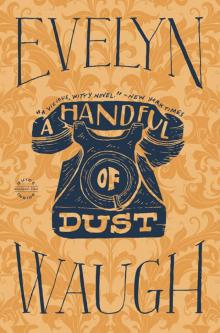 A Handful of Dust
A Handful of Dust Complete Stories of Eveyln
Complete Stories of Eveyln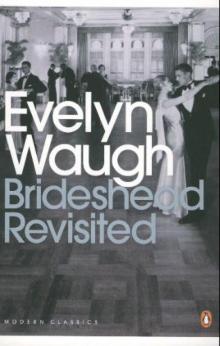 Brideshead Revisited
Brideshead Revisited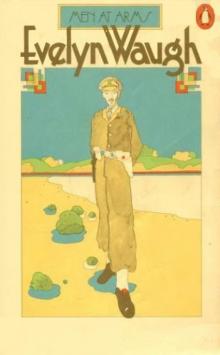 Men at Arms
Men at Arms Black Mischief
Black Mischief When the Going Was Good
When the Going Was Good Officers and Gentlemen
Officers and Gentlemen Helena
Helena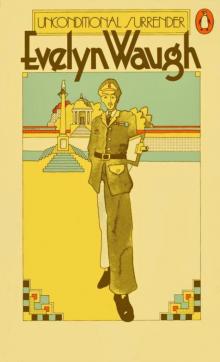 Unconditional Surrender
Unconditional Surrender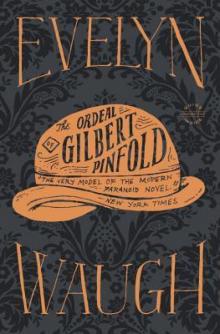 The Ordeal of Gilbert Pinfold
The Ordeal of Gilbert Pinfold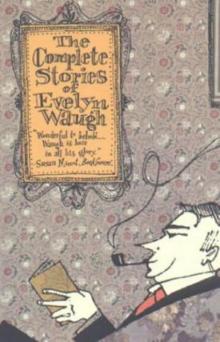 The Complete Stories Of Evelyn Waugh
The Complete Stories Of Evelyn Waugh